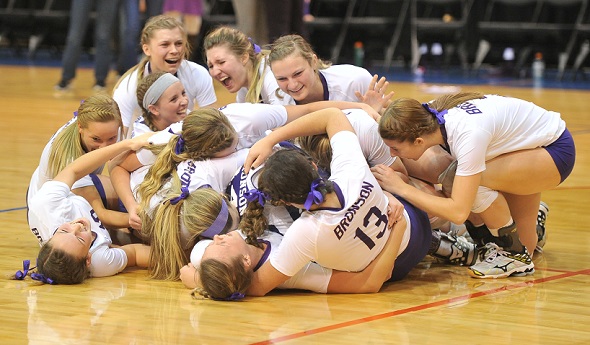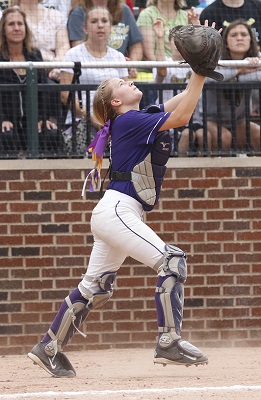
Multi-Sport Experience 'Special' for Bronson
By
Wes Morgan
Special for MHSAA.com
February 2, 2016
An increasing number of high-profile athletes and coaches are becoming more vocal about the importance of a well-rounded adolescent athletic experience. More and more parents and athletes, so it seems, are heeding that advice.
 That’s the case in Bronson, a town of fewer than 2,500 residents that manages to keep rolling out successful varsity sports programs. Or perhaps it’s that athletes in Bronson never bought into sports specialization as much as other communities in the first place.
That’s the case in Bronson, a town of fewer than 2,500 residents that manages to keep rolling out successful varsity sports programs. Or perhaps it’s that athletes in Bronson never bought into sports specialization as much as other communities in the first place.
Bronson athletic director and Vikings varsity volleyball coach Jean LaClair, who received the Michigan High School Athletic Association’s 2015 Women in Sports Leadership Award, said it’s critical at a smaller school such as Bronson to emphasize participation in more than one sport.
But, through decades of coaching, she’s seen the effects of athletes choosing a narrow focus.
“I think for most schools and most sports, we’re seeing our numbers dwindle,” she said. “I believe that a lot of parents take their kids to travel ball, and it’s taking them out of high school sports. I think club sports are kind of hindering our high school athletics.”
The National Collegiate Athletic Association reports that six percent of high school athletes go on to play in NCAA programs, and as of 2012 fewer than two percent of high school athletes earned an NCAA Division I scholarship (of any amount), according to a CBS MoneyWatch report. Fewer than eight percent ever play a varsity sport at any collegiate level, according to a study by ScholarshipStats.com.
It’s an admirable dream, but an unlikely one. And along with that gamble comes the great possibility of burnout. Some studies have also suggested that young athletes competing in only one sport year-round are at a higher risk of injury. On top of that, specialization doesn’t seem to improve those odds.
“If you want a (college) coach to know about you, just do some work and they’ll know about you,” LaClair said. “That’s how I look at it. If you’re good enough, a coach is going to see you. You don’t have to go to a club tournament to be seen.”
Though participation in multiple sports is commonplace amongst both genders at Bronson, girls sports in particular have reaped the rewards of such commitment.
 Look no further than the Vikings’ Division 3 runner-up performance in softball last spring (they lost to Monroe St. Mary Catholic Central in the Final), which seemed to fire up the volleyball squad this past fall.
Look no further than the Vikings’ Division 3 runner-up performance in softball last spring (they lost to Monroe St. Mary Catholic Central in the Final), which seemed to fire up the volleyball squad this past fall.
Bronson’s netters tore through the postseason en route to a Class C volleyball championship, earning some revenge by beating Monroe St. Mary Catholic Central in three games.
It was the Vikings second MHSAA title since 2009.
Four athletes who competed on both teams are currently playing basketball: senior Kelsey Robinson, sophomore Adyson Lasky, sophomore Kiana Mayer, and sophomore Payton Robinson. Senior Alexa Ratkowski, an all-state selection in volleyball, also is on the basketball team.
Of the 13 volleyball players who hoisted a trophy at Kellogg Arena in November, six are two-sport athletes and seven are three-sport athletes.
And of the 11 varsity basketball players currently on the Vikings’ girls roster, eight played volleyball and a total of 10 participated in a fall sport.
As Kelsey Robinson’s prep career winds down, she believes playing several sports has made her better at each one. Not to mention she and her classmates find joy in the memories created through a variety of competitive situations.
“It’s just really fun to do different things,” said Robinson, a defensive specialist in volleyball, a former cross country runner, a guard in basketball and a third baseman and centerfielder in softball. “We don’t have a lot of the numbers, but we have the people who are willing to put in the hard work, even if it’s not their best sport. Each season is only three to four months at the most. So it keeps things exciting.”
Some do take part in the club scene on a smaller, more local level. Most take advantage of the coaches at Bronson who are generous with their time.
“I’ll get into the gym with any kid any time they want to,” LaClair said.
 Wes Morgan has reported for the Kalamazoo Gazette, ESPN and ESPNChicago.com, 247Sports and Blue & Gold Illustrated over the last 12 years and is the publisher of JoeInsider.com. He can be reached at [email protected] with story ideas for Berrien, Cass, St. Joseph and Branch counties.
Wes Morgan has reported for the Kalamazoo Gazette, ESPN and ESPNChicago.com, 247Sports and Blue & Gold Illustrated over the last 12 years and is the publisher of JoeInsider.com. He can be reached at [email protected] with story ideas for Berrien, Cass, St. Joseph and Branch counties.
PHOTOS: (Top) Bronson volleyball players celebrate clinching the Class C championship at Kellogg Arena in the fall. (Middle) Then-freshman catcher Payton Robinson prepares to catch a pop fly during last season's Softball Finals weekend at Secchia Stadium.

MHSA(Q&)A: Mendon football coach John Schwartz
February 2, 2012
 John Schwartz didn’t really want the Mendon football head coaching job when a group of players convinced him to take it before the 1989 season. And his first contract started out on a napkin. The rest is history.
John Schwartz didn’t really want the Mendon football head coaching job when a group of players convinced him to take it before the 1989 season. And his first contract started out on a napkin. The rest is history.
Mendon won its 11th MHSAA football championship this fall, downing Fowler 33-0 in the Division 8 Final, to tie for third-most football titles won by one program. Schwartz has coached in the program for all 11, including 10 as head coach, and his record of 236-39 gives him a winning percentage of .858, tops in the MHSAA record book. He recently was selected as this year’s recipient of the high school Duffy Daugherty Award, annually given for career contributions to the game. He follows recent winners Ralph Munger of Rockford and Herb Brogan of Jackson Lumen Christi.
His Mendon teams have had just one losing season. And although he retired a year ago after 36 teaching middle school science, and then fought off cancer over the summer, he has no plans to leave his post on the Hornets’ sideline.
How would you characterize your program?
I think we have very good coaches and I think the kids respect the coaches, and they know the coaches think more of them than just being football players. They care about them. We have their attention, and what we really try to do is form a team concept as soon as we can. We try to stay away from giving any one person too much recognition. We don't give out MVP awards at the end of the year. It's a program where we're all in it together: coaches, kids and community. We try to get the best out of the kids, give the kids the best shot we have at being the best we can be.
How does a small school continue to reload every season?
My first year there, the first thing I did as a head coach was I started the junior high program. I think that's where everything starts. We even have the younger kids called the rocket kids, and those coaches come in and talk about (football) terms so when kids move from one level to another there's no re-teaching. Everyone has an ego, coaches have egos, and they like to do some things differently. But we don't have that. They do what we do. We give them a lot of flexibility, but we have certain drills we want to run. By the time we get them, these kids are in tune with what we are doing. The summer program also is something I started my first year as head coach too. ... It means that during the season we can concentrate more on teaching than conditioning.
You went from 3-6 in 2006 to 12-0 in 2007. Explain how you bounced back.
The losing season we had, we didn't have a lot of kids, and our two best kids were hurt early in the season and couldn't play. We never did bounce back. Even in that season, we were ahead at halftime in all but one game. We just didn't have enough to come back and pull the game out, and we had some very tough games. It wasn't a good season, but I thought those kids played awfully hard for what we had. We got a lot of experience, and it paid off the following year.
Our JVs practice with the varsity. When I work with inside linebackers, I work with (grades) 9-12. Kids learn quicker from kids than from coaches, as far as I'm concerned. ... Football's really changed. It's become a lot more complex. I think we have to delegate more and more every year so we can stay with the changes. It's too much for one person. I remember my first three, four or five years it was just three of us at the varsity level. The other two, neither one taught at the school. We were pretty successful right off the bat, and we started getting more and more interest from people. Now 9-12 we have seven coaches, and we have three at the junior high, and all the coaches but two have played for me. They know what I expect, what I'm looking for, what I want. ... And they want to win. I'd be lost without those guys.
Are there certain seasons that have meant more than others?
The first year I took the job, in 1989, we went undefeated and won a state title. A lot of those kids are very good friends of mine yet, and they're pretty special to me. They were a big boost to my program. In the '95 year, my son was a sophomore on that state title team. I remember a lot about that team.
They all have something they did very well. They either threw the ball well or played great defense or had a big line. When I hear a year now, I think about those teams.
You grew up in a small town (Colon) and have taught and coached in a small town. Was that important for you to do?
I've never taught anywhere else. I never felt I really had a reason to leave. I've gone through at least six superintendents since I've been there. The fourth or fifth said to me, "The only thing that bothers me about Mendon is these people think an awful lot of winning. There are other things." He asked me, "How do you feel about it?" I said, if they didn't feel that way, I wouldn't be here.
Who was your biggest coaching influence?
I would say Morley (Fraser, Jr., under whom Schwartz was an assistant for three seasons). Years before I got there, Mendon was pretty good in the early 70s, and then in the mid 70s football wasn't very good. I was the JV coach the first year, and the second year after two games they brought me up to varsity. The best thing I did was I told them I would not take the head job, but I'll assist. I knew (Fraser) was the kind of person and personality we needed there. It wasn't necessarily all of his football knowledge, but his energy and excitement that he brought to the game.
You said during the Finals postgame press conference that you'd battled cancer during the summer. How did you come back, and did you ever think that might be time to step down?
Everything's fine. I had coaches that took over. At the same time that that happened, I was retiring. If you retire in Michigan, you can't be at the school for one month. So I couldn't be at summer weights all the way through June. So my coaches did all the summer weights. But I had no intention of stepping down. If something (bad) came down ... but once they said they got it, everything went as normal.
After a championship season, how do you ramp things back up for the next fall and a new group of players?
When we go to the playoffs, we take all the JVs unless there are couple who don't want to go. They experience that and get an extra five weeks of practice if we win a state title. And they're excited about it. They want to do that. They’ve' tasted it, and they want a part of that the next year. We remind them it's not what you did, it's what can you do for me now. ... This is your year.
We talk about winning state championships from day one. A lot of people say we shouldn't do that, but why not? Isn't that the ultimate goal? I can't imagine telling a team we think we could be 7-2 this year. We expect to be 9-0 every year. Of course, that's not going to happen. But at same time, I think the losses make you better the following week. We've won state titles where we haven't won the league title. ... You get better.
PHOTO: Mendon coach John Schwartz talks things over with his players during the Hornets' 21-14 win over Decatur in the 2002 Division 7 Final at the Pontiac Silverdome.


